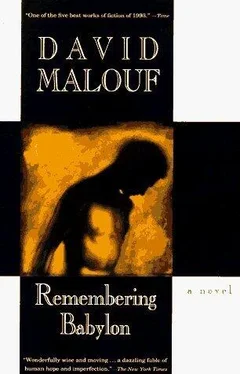His object always was to make himself agreeable to the girls, to play the pupil when they wanted to be teacher, the doll when they wanted someone to dress up. But he kept a watch on Lachlan, ready always if necessary to appease; and the boy, because he was very quick in his perceptions, felt it and knew his power. He led the man on an invisible leash, swaggering before the other children of the place, and only when they were alone together let out his natural affection.
The girls, especially Janet, took a great interest in how he kept himself.
‘No, no, Gemmy dear, let me do it,’ she would say when he failed to button his shirt straight. Or, laughing at the way his hair stuck out in quills and would not be disciplined, ‘Sit still, now, there’s a good fellow, and I’ll brush it and make you neat. I’m giving you a nice parting, Gemmy, see?’, and little Meg would hold up the mirror, looking at him rather quizzically over the top of it, while Janet handled the comb.
But there were times, too, when he felt an uneasiness in the older girl, as if she saw that he could not be treated as a child or plaything. He would catch her regard upon him, it was solemn, and an odd feeling would come over him that she was trying to see right into him, to catch his spirit, aware, as the others were not, that he was not entirely what he allowed them to see.
He was surprised. If anyone else had looked at him that way, he would have felt his bowels go soft. But her gaze was so open and vulnerable that he felt no threat in it, and in himself only a stillness, a sense of tender ease at being exposed a moment — not to her, but to himself. Then a cloud would come to her brow and she would glance away.
For her, too, he thought, it was that moment when she had first seen him balanced up there on the fence that she was looking towards, and he felt in the concentration of her gaze that he hung there still. Something, in that moment, had been settled between them, as it had between him and the boy.
He went back and back to it. In the strange flickering light of the empty afternoon, with the sky ablaze on his shoulders, his belly empty, little insects opening and closing their wings over the still grass heads, the long, wavering note of crickets endlessly extended, he would stand gripping the fence rail with his toes, trying to stay up there long enough to take it all in, with the tendency to overbalance growing and growing in his upper body as if it was his heart that had been thrown off balance, and the three children staring: the boy, eyes narrowed, jaw set, with the stick at his shoulder; the dog in midair, also suspended, his tongue dripping; the gawky, fair-haired girl with one hand raised against the sun, the thin wrist arched, and for the first time that puzzled look in her eyes that might, he sometimes felt, just in itself have held him there, never to fall, so intense was the power of her gaze. If he had given himself over to that rather than to the heaviness of his own body, he might have stayed up there for ever. That was what her look meant. Only at that moment he had failed to grasp it.
She was a puzzle to him. He could never be sure what she was thinking. He knew the boy’s thoughts because he wanted them known. His power lay in your recognising that he possessed it. It was the power that belonged to him because he was a boy; because, one day, the authority he had claimed in raising the stick to his shoulder would be real. It made him both easier and more dangerous. There was always in your dealings with him something to be taken account of: his concern for those whose eye he was trying to catch. The girl’s power was entirely her own. She needed no witness to it.
As for the adults, he soon developed for Ellen McIvor, the mother of the little girls, an affection of a kind he had not known before; he had so little experience in his life of either the domestic or the feminine. It pleased him to find things he could do to make her life easier, and all the more to see the shy, offhand way she accepted them. The desire he had to give her pleasure had in it none of the anxious need to placate that lay behind every gesture he made towards the man of the house. It was free. He felt lightened by it.
Jock McIvor, on the other hand, was from the start uneasy with him. He tried to be fair, to be patient, but his heart was not in it.
When Jock came to him with a request, or more likely a complaint, he felt like running. He shuffled, turned his shoulder; Jock immediately took it the wrong way. ‘For God’s sake, man, Ah’m no’ gonna hit ye. Ah jist want t’ tell ye again, ye’d better no’ follow the bairns aboot — Ah’ve telt ye a hunner times. An’ ye’d better no’ gang wand’rin’ on the Masons’ side either. Ah’ve telt ye that as weel. Barney’s nervous. Ah dinnae mean t’ tell ye again.’
The man was troubled. Gemmy saw it and was watchful. Jock’s fear of getting on the wrong side of his friends might in the end be more dangerous to him, he thought, than the open hostility he met in the settlement, where he was always under suspicion, and always, even when no one appeared to be watching, under silent scrutiny.
What had brought him to them? Even after weeks in which he had become a familiar sight around the settlement, they continued to put the question to one another, or, more darkly, to themselves.
Was he in league with the blacks? As infiltrator, as spy? Did he slip off when they were not watching — they had work to do, they could not always be watching — and make contact with them? Did they visit him secretly at night? Maybe they did not even come in the flesh but had other, less visible ways of meeting and passing information that a white man would not recognise because it was not in a white man’s mind to conceive of it. Even those who were well-disposed to the fellow found him unnerving.
He wasn’t all there, that’s what people said; they meant he was simple. But there were some among them for whom the phrase, light as it was, suggested something darker: that even when he was there, in full sunlight, refusing to meet your gaze but engaged, so far as he was capable of it, in conversation, he was halfway gone, across a line, like the horizon, that was not to be fixed in real space, and could begin anywhere.
‘He’s makin’ mugs of yous,’ Ned Corcoran asserted. ‘You k’n say what you like about ’im. He don’t fool me.’
They frowned and looked away.
You learned up here to make allowances, but Ned Corcoran was not a man they had much respect for. His idea of neighbourliness was to send one of his boys across (he had a whole mob of them), usually the soft-eyed eight-year-old, to borrow some implement or other that then found its way into his store. Months later, out of pure generosity, he would lend it out to some other fellow as if it was his own. He’d get it back, too. He’d send the same shamefaced eight-year-old to ask for it, who would stand with his mouth open, breathing, while you fetched it for him. They were indulgent of this little eccentricity but resented it when Ned assumed a superior tone and told them bluntly that the black white-feller was trading on their goodwill.
Was he?
Thwarted by their failure, most of the time, to grasp what the codger was after, and suspecting that his giggling and sidling and hopping about on one foot was meant to make a fool of them, some men would grow hot under the collar and begin to push him about; to the point at times where they had to be restrained. Even those who felt sorry for the man found themselves dismayed by what they called his ‘antics’. They felt an urge, when he went into one of his jerking and stammering fits, to look hard at the horizon, and when that yielded no satisfaction, to give grave attention to the dust between their boots. He was a parody of a white man. If you gave him a word for a thing, he could, after a good deal of huffing and blowing, repeat it, but the next time round you had to teach it to him all over again. He was imitation gone wrong, and the mere sight of it put you wrong too, made the whole business somehow foolish and open to doubt.
Читать дальше












